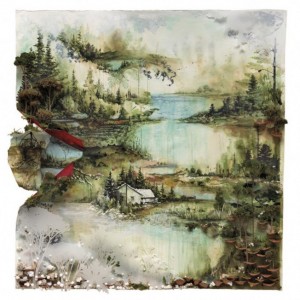When it is so easy to simply download a song here or there, I wonder if anyone still values the album as its own complete entity as I do. The album is something outside the tangible plastic discus; it is a living, breathing organism –not just a container for randomly composed songs. I have always been a firm believer in considering the whole album, and not just the bits and pieces that comprise it. And I always like those artists best who consider the album as a carefully constructed artwork and not just a thrown together collection of songs.
When deciding on the best albums of 2011 thus far, I immediately go to Bon Iver’s self-titled album, the follow-up to Justin Vernon’s largely solo project of 2007, For Emma, Forever Ago. I remember 2007 being a rather barren year for new music, and I remember just clutching the introspective moody Bon Iver debut closely to my chest and immersing myself in the profound sadness and moving passion. It was the only album that year that made me somehow feel something, that transported me to somewhere else. “Skinny Love” was practically an anthem for me, allowing me to feel vindicated for past broken relationships by just running a little faster on the treadmill when it played on my MP3 device. And maybe that’s the quality I like best about Bon Iver: songs that on the surface may be cordoned into the emo subgenre of folk, but are actually full of pure, high-octane energy.
Bon Iver maintains the subtle, yet dynamic experience of For Emma, Forever Ago while broadening the musical range. Bon Iver has moved from Justin Vernon’s largely solitary musical project to an actual band project, bringing a new range of sounds and instruments to this album. Bon Iver’s own lyrics are deeply layered, but now the music is richly layered, too.
This album is impressionistic and far less strained. The opening track “Perth” opens with a slow electric guitar solo building in the background of Justin Vernon’s distinctive vocals before breaking open into a carefully layered pattern of fife and drum. The winsome vocals, the jagged guitar twinges, and a shrill violin — sounds that separately could be weary and jarring– dovetail into a crescendo of soulful sound on this opening track. Nearly all the songs on this album are named for dwellings –both real and imaginary– and perhaps on “Perth” you can hear the untamed nature of a variety of instruments coming together in some structure, but unraveling gently at the seams, perhaps symbolizing an “outback meets civilization” theme without hackly resorting to any tribal sounds or overly mechanized synthesizers. As always, it is Vernon’s own vocals which are the central design in the fabric.
“Minnesota, WI” borrows distinctive sounds of ‘70s band –some jazz horn and drum beats– that at first recall both Steely Dan and the steady pulsing energy of The Police. The reverberated vocals blend with the horns while a sweet acoustic guitar, soon joined by the twangy rhythms of a soft banjo, accompanies Vernon’s pitchy cries. The weaving of multiple vocal tracks forms the base of this tapestry, and as we expect with Bon Iver, is the highlight. “Never gonna break, never gonna break, never gonna break” repeats Vernon.
The lyrics for this project are at once both beautiful and downright arcane. Bon Iver released the lyrics for all the songs early online. At first, the lyrics seem difficult to comprehend and almost random, but they are not as haphazardly strung together as they might seem. They are impressionistic, but not the product of a casual stream of consciousness style. Rather, the lines are more reminiscent of Walt Whitman and James Joyce, requiring careful study if you are to assign a precise paraphrase of the verses. But these lyrics are meant to be heard and digested as sounds, not read and interpreted, and when combined with the layered instruments and vocals are best appreciated holistically.
Still, by examining the lyrics, such as in “Hinnom, TX” one can gather some common themes throughout the album. According to the Biblical Encyclopedia, the meaning of “Hinnom” is unknown, but in the book Jeremiah, the prophet uses “Hinnom” to reference the “valley of the sun.” As a biblical allusion it works well as Vernon sings of nature’s elements in motion: sand and sun, dirt and ice. And like all the songs on his album, the antiquated sounding biblical allusions –such as to the Noahchide– all contribute to the poetic majesty of Bon Iver’s songs. Noachide laws recall Old Testament fire and brimstone, for these were the laws supposedly given to Adam and Eve and all of humankind. The Noachide laws include prohibitions against idolatry, murder, theft, lying, sexual immorality, and cannibalism. And looking at its shroud imagery, “Hinnom, TX” is perhaps a song about the afterlife, except in Bon Iver’s song, the bodies remain on earth, recuperated by nature’s elements and afterlife is given no presence, no definition. As much as Vernon alludes to Old Testament imagery, it is never in a monotheistic interpretation, but rather a reimagining of those allusions in a secular light.
The songs that are the highlights on the album are impressively good. “Michicant,” for example, offers the nostalgia of a boyhood in a place that is maybe too ideal to actually exist like the title itself suggests: not Michigan, but Michicant. It even features a childhood bicycle bell ringing in sync with the other instruments. It’s both soft and quiet, stirring without disturbing, a meditation on a less complex time and place.
“Calgary” is the standout, and a featured single on KCRW, WXPN, and other public radio stations. The rich tapestry of unusual sounds layered to create a soulfully textured, masterfully crafted song that echoes of ghosts and personal struggles, is an easy choice for single of the year. It features all the hallmarks of Bon Iver: strong vocals, crescendos, cadence, poetic but puzzling lyrics. And it’s not the typical sorrow-infused lyrics featured on For Emma, Forever Ago, but something that haunts with passion. Any themes of sadness and regret are not awash in these strung-out cries for forgiveness, but are like prankster demons rattling the pots and pan in the kitchen at night.
Bon Iver ends oddly with the song “Beth/Rest.” On the surface, it seems like a 1980s homage, featuring synthesizers and electric guitar twangs that remind me of the “power ballads” of REO Speedwagon and Toto as well as the soft rock sounds of Bruce Hornsby and Howard Jones. There’s even a Kenny G-like clarinet. The highly stylized quality suggests wide expanses, maybe tying together all the locations on the album. It’s not my favorite song, mostly because of its retro qualities which continue on throughout the tune. But like the other songs, they are carefully layered sounds, artfully crafted to create a mood which is both melancholy and hopeful at the same time, perhaps depending on how well you like synthesizers.
Who will adore Bon Iver’s latest album?
- Anyone who has a Band of Horses, Iron and Wine, or Fleet Foxes tagged Last.fm or Pandora station.
- Anyone who wishes Conor Oberst of Bright Eyes could be just a little more moody, but just a little less angry.
- Anyone who appreciated the complexity of Paul McCartney and Wings’ “Band on the Run” despite the nonsensical lyrics.
© 2011, The Indie Mine. All rights reserved.






I saw something similar on another blog… interesting.